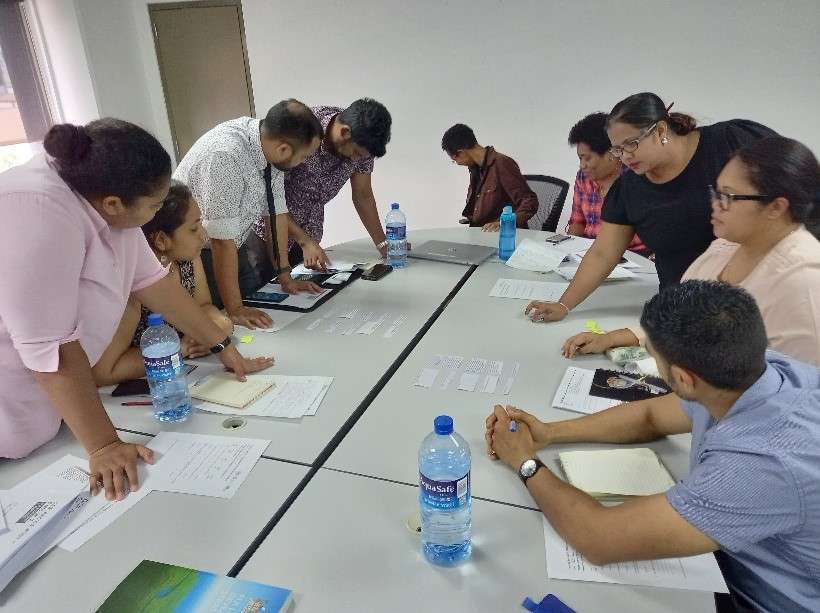
“Women commonly face higher risks and greater burdens from the impacts of climate change in situations of poverty and due to existing roles, responsibilities, and cultural norms,” stated Fiji’s Minister for Women, Children and Poverty Alleviation, Mereseini Vuniwaqa during the Second Convention of Fiji Women Defending the Commons in December 2019. “It is critical that the needs, perspectives, and ideas of women, as well as of men, are included in climate action so as to create just, effective, and sustainable solutions.”
Since 2020, the USAID Ready Project, implemented by DT Global, has been working in close collaboration with Fiji’s national agency responsible for climate change policy matters, the Climate Change and International Cooperation Division (CCICD) under the Ministry of Economy (MoE). This support, provided through the Green Climate Fund Readiness Project, is assisting the Ministry to become accredited as a "Direct Access Entity" for the Fiji Islands. Green Climate Fund accreditation will enable the Government to have more direct access to climate finance and the management capacity to undertake vital adaptation and mitigation activities.
As part of this process, Colleen Peacock, USAID Ready’s Gender Equity and Social Inclusion (GESI) Specialist, is assisting the MoE to develop a GESI Policy and Action Plan in line with Green Climate Fund’s requirements and relevant international and national policy frameworks. As a first step, Peacock worked with Ministry staff to conduct a GESI assessment of the external environment, including the overall status of women and other vulnerable groups, the barriers to equity and inclusion, and the opportunities that exist to bring about sustainable and transformational change. This assessment also examined the MoE internal operating environment. Results from the assessment identified several ways that revisions to policies and procedures could strengthen GESI responsiveness and how increasing staff capacity could promote equality and inclusion.
Based on the findings of this assessment, Peacock led the development of the draft MoE Internal GESI Policy (2021-2024) and draft Action Plan (2021-2022), currently in final internal approval stages. The Policy and the Plan identify the priority tasks needed for each MoE Division to fully mainstream GESI across all work areas. This policy development process was highly participatory and involved several rounds of whole-of-ministry consultation, discussions with key external stakeholders, and GESI awareness and training sessions for MoE staff.
When asked about this work, Peacock said she became aware of the growing interest and commitment across the MoE with each round of consultation. "The policy development process originally focused on ensuring gender was fully integrated in climate change activities led by the CCICD, but other Divisions started to advocate that GESI should be fully mainstreamed across the entire Ministry,” said Peacock.
“Over the course of two months, each Division self-identified barriers to equity and inclusion and identified their own strategies to address these issues," she continued. "For example, the Administration Division committed to developing a workplace sexual harassment policy, the Fleet Division identified the need to engage more female drivers and install better safety and communications equipment, the Fiscal Research and Analysis Division committed to improving GESI disaggregated data collection and analysis across the public sector, and the Department of State Owned Enterprises plans to initiate a training and mentoring program to address the significant underrepresentation of women on State Owned Enterprise Boards of Directors in Fiji. The Plan also makes a commitment to fast track Gender Responsive Budgeting in partnership with the Ministry of Women and other government agencies. And these are only some of the highlights!"

Progress like this needs a strong champion. As Acting Head of CCICD and Climate Finance Specialist, Vineil Narayan, explains, “The Ministry of Economy is proud to champion gender-centric development planning and inclusive climate action by mainstreaming gender considerations into its internal policy and operational space. MoE is the first Government Ministry to develop a GESI Policy and GESI Action Plan, which are undergoing final internal approval.”
On the positive results that are already being felt, Acting Head Nayaran remarks, “Both documents are already helping us improve the socio-economic quality of projects and programmes that we administer, as well as create an enabling and equal opportunity environment for women to ascend into leadership roles. We hope that other Government Ministries and agencies can follow suit.